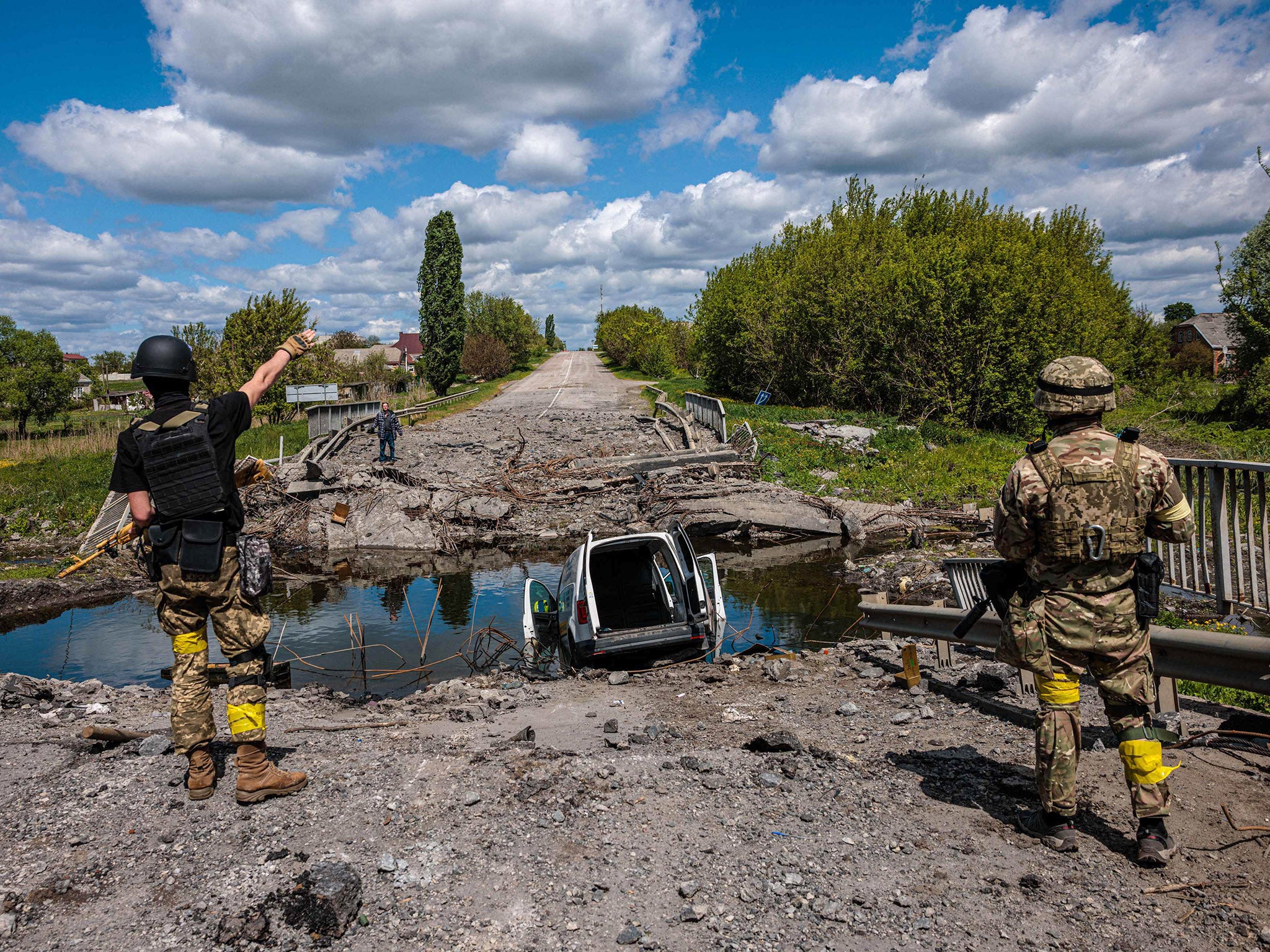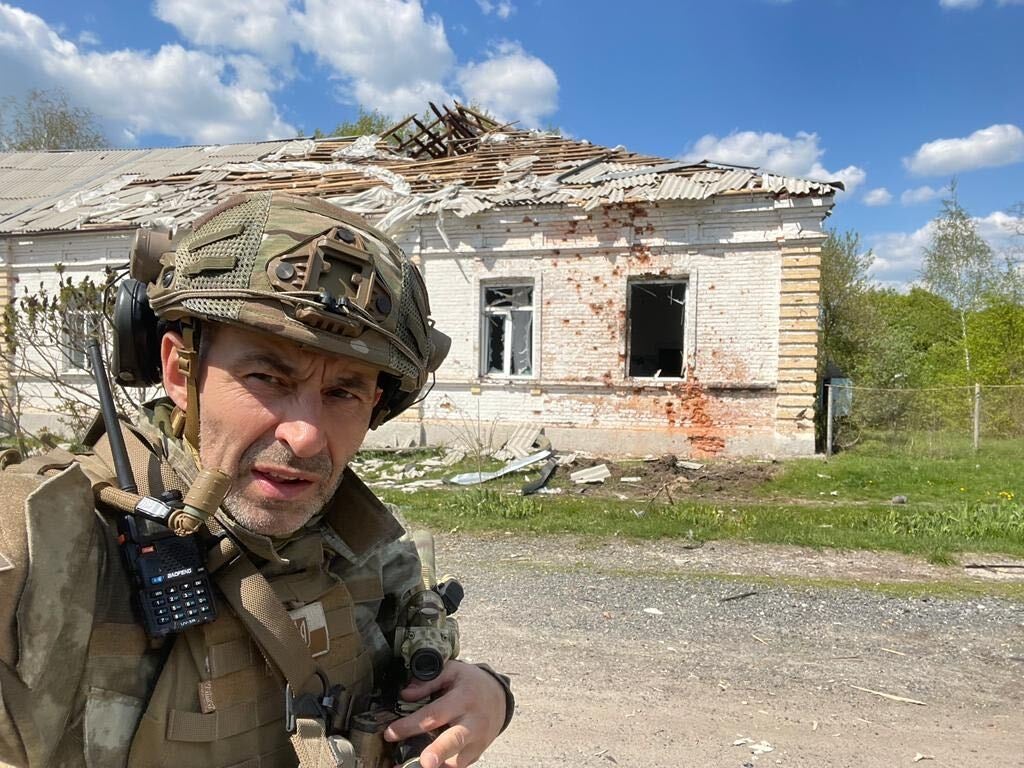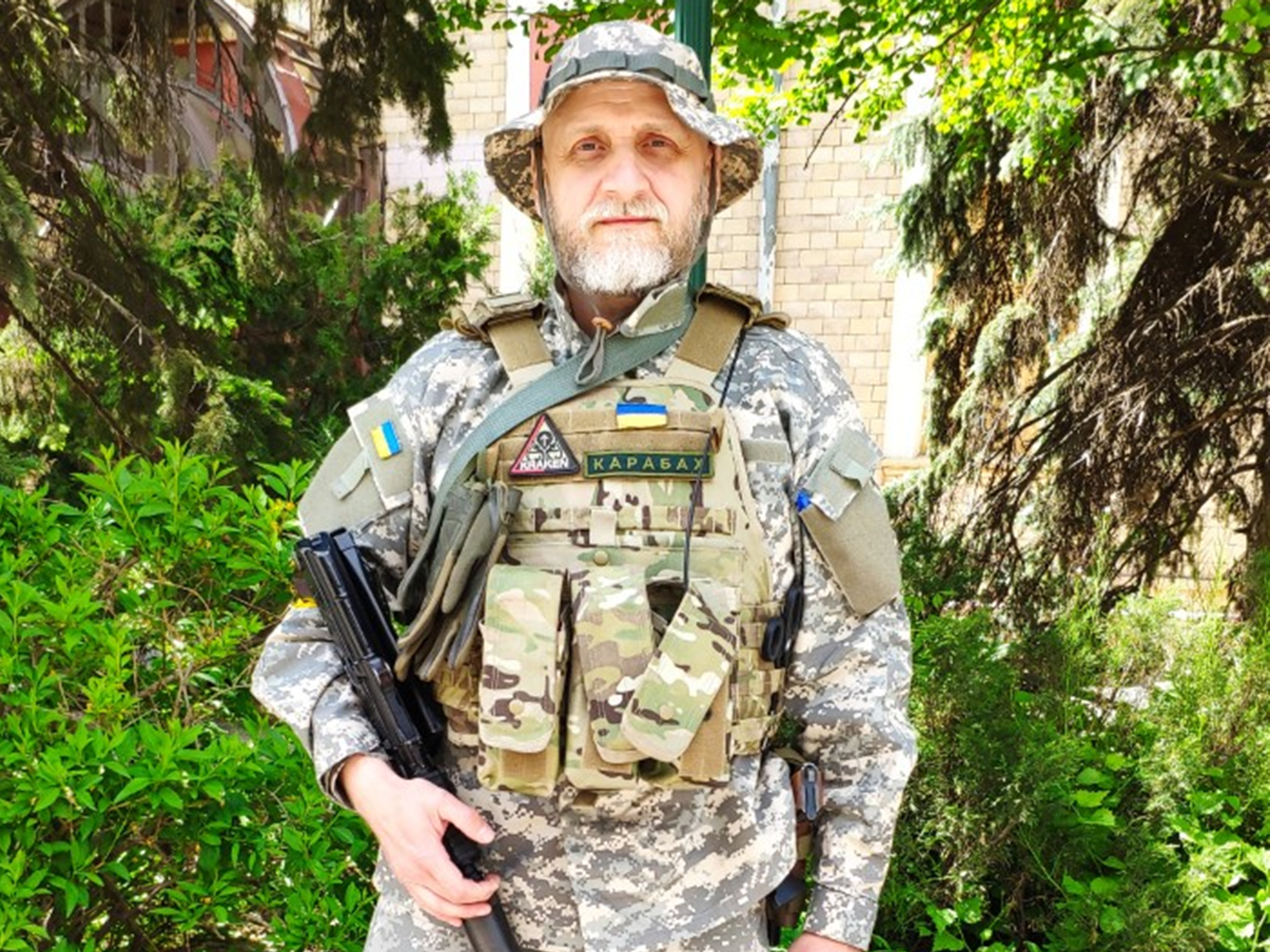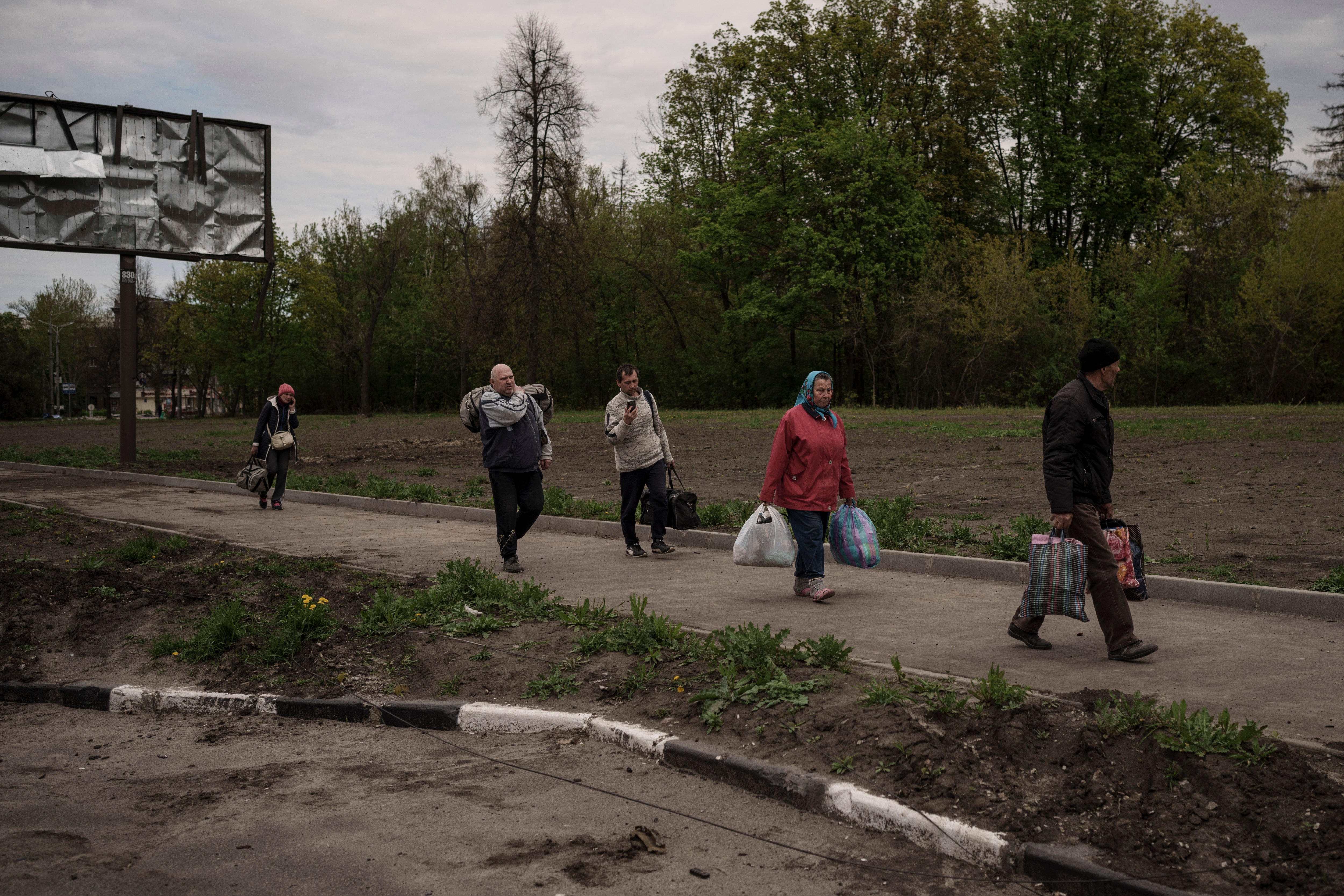Inside the recaptured Ukrainian village still under attack from retreating Russian forces
Kim Sengupta visits a liberated flashpoint near Kharkiv that Putin’s forces won’t give up without ‘a hard and long fight’


Your support helps us to tell the story
From reproductive rights to climate change to Big Tech, The Independent is on the ground when the story is developing. Whether it's investigating the financials of Elon Musk's pro-Trump PAC or producing our latest documentary, 'The A Word', which shines a light on the American women fighting for reproductive rights, we know how important it is to parse out the facts from the messaging.
At such a critical moment in US history, we need reporters on the ground. Your donation allows us to keep sending journalists to speak to both sides of the story.
The Independent is trusted by Americans across the entire political spectrum. And unlike many other quality news outlets, we choose not to lock Americans out of our reporting and analysis with paywalls. We believe quality journalism should be available to everyone, paid for by those who can afford it.
Your support makes all the difference.The first mortar rounds are outgoing, aimed at Russian forces beyond a ridge. But the ones that follow are incoming, heading for Ukrainian positions, and land near the troops in their base.
The exchanges take place at Ruska Lozova, a village set in a landscape of woodland, valleys, streams and fields, which was officially liberated at the end of last month by Ukrainian troops, driving away the Russian forces that had laid siege to nearby Kharkiv.
It is just six miles north of the city, and the presence of Russian forces here, with tanks, artillery and air support, is an illustration of the fragmented front line here in the northeast of Ukraine.
The highway from Kharkiv is pitted with holes from artillery and airstrikes, and strewn with spent cartridges and shell casings. The grass verges on both sides are mined, so drivers have to ensure they do not stray from the centre of the road.
The motive behind Russia’s determination to maintain a presence in this area is to try to ensure that its supply lines are kept open to Izium, a town being fought over in an attempt to cut off Ukrainian troops in the Donbas – the Kremlin’s new focus for its military action after the failure of Russian forces to capture cities such as Kyiv and Kharkiv.
“That was quite close... they are not so far away,” says commander Vsevolod Kozhemyako, as another mortar round lands near the wrecked industrial premises that have become the base for his unit.
“We have had regular shelling here. The Russians are well dug in; they are desperate to block us from breaking through – if we break through then their routes to Izium are in danger. So this is turning into quite a hard and long fight.”

The Khartia volunteer battalion, alongside a detachment of Ukraine’s National Guard, recaptured the village in April. But the Russians remain here in force. Three Ukrainian soldiers were killed last week, and a number were wounded. The Russians have suffered dozens of casualties, say the Ukrainians.
The base was used by the Russians before the area changed hands. “It was absolutely filthy. We really had to clean it up and secure it properly. And then the challenge was to make sure they did not get it back,” says Commander Kozhemyako. “The scale of attacks from the very beginning showed just how much they wanted to drive us out... how much value they put on this place.”
The fighting has spread to adjoining areas, resulting in widespread destruction, including of an internationally renowned plant-gene research facility in the village of Pytomnik, which contained 160,000 varieties of plant seed. It was reportedly hit by a Russian missile. Ukrainian officials have described what happened as “deliberate ecological vandalism”.
The Russians have held the high ground over the Ruska Lozova base, providing effective vantage points for artillery barrages. Attacks have also continued to come from tanks and from the air, both from drones and from helicopter-gunships. The Ukrainians have placed anti-aircraft artillery in the village; the Khartia battalion base holds a supply of anti-tank missiles, including British-supplied N-LAWs.
Advanced weaponry has been deployed around the village by the Russians. Ukrainian forces say they captured a T-90M, Russia’s main type of battle tank, last week, alongside other armour. Sorties are being carried out by Mi-28 “Havoc” gunships and Orlan-10 drones. Electronic warfare equipment is also in use: the Ukrainian forces are extremely wary, with good reason, of their communications being breached.

However, troops from the separatist “Luhansk People’s Republic” are not so well armed, say the Ukrainians. Some were found to be using bolt-action Mosin-Nagant rifles that were first developed in the last century, and wearing body armour that offers little protection.
“They are not boys, but men, and well experienced if they have been fighting for the last eight years,” says Kozhemyako. “Some had good weapons, but others were actually using old Mosin rifles, believe it or not. Many of them said they were dragged off to their army to come and fight; who knows whether they were telling the truth.
“The Russians throw these soldiers forward – they don’t seem to care about the losses. They are relying on force of numbers. These guys are being sacrificed, they are getting killed. They are meat for the grinder.”
More mortar rounds land nearby, then a faint whistle of a missile fades in the fields behind before landing somewhere with a distant thump.
Such attacks were incessant in the first days after the position was taken over. “They were trying to find range, and the shelling would come very near, go back, and then come near again. It was very worrying,” says Kozhemyako.
Khartia is one of the volunteer battalions that have proved their worth on the front line in this conflict. Although they get weapons from the government, the bulk of their activities are self-financed.
Kozhemyako, a businessman before the war, lives abroad with his family. Two days after the war began, he abandoned a skiing holiday to get back to his homeland.

“I was coming into Ukraine as thousands of people were leaving. Elderly people, women with children, the foreign students who were here, forced to flee – it was such a sad sight,” he says. “I just hope that my city, Kharkiv, doesn’t fall before I can get there.”
He and others in the business community had become convinced during the separatist conflict that large-scale war would come to Ukraine sooner rather than later, and they began training citizen volunteers. That’s one of the reasons, they say, for the combat effectiveness of the Ukrainians.
Commander Kozhemyak stresses that he will continue to take part in the conflict until “it’s over”. In his mind, this means until all “occupied territories”, including Crimea and the separatist republics of Donetsk and Luhansk, are retaken. “If we don’t finish this now, then the Russians will start a new war in a few years’ time. Surely our friends in the west realise that? They were warning us about this invasion, and I wish we took it more seriously,” he says.
The soldiers in the unit seem equally adamant that operations need to continue until the whole of Ukraine, as they see it, is liberated. Gary, a former student of aviation technology, says: “I felt from 2014 [the start of the separatist war] onwards that Russia would one day carry out an invasion of Ukraine. This has now happened, and we have managed to fight them off on many of the fronts. We need to continue now; it’ll be a big mistake to stop.”
“Doc” – a combat medic, as his call sign indicates – adds: “This was a war imposed on us. We are defending our country. No one wants to see suffering, but we are now freeing people who have been under occupation, so things will start to get better.”
The soldiers have been providing medical treatment for local people hurt during the fighting, taking the more seriously injured to hospitals in Kharkiv.
Ukrainian forces evacuated most residents after the village was recaptured. Many homes had been looted, and some young men had been seized by the Russians and taken away.

“They seemed to have looted even the more humble homes, taking away everything they could carry. Some men were taken away... we don’t know what happened to them,” says Oleg Supareka, deputy commander of the Kraken Regiment, which brought out the villagers. “These people have been under occupation from the beginning. They were in a bad state.
“The Russians started shelling as we were carrying out the evacuation. They knew that civilians would be at risk, but as we have seen in other places, that was not something they cared about. Two of our vehicles got hit, but luckily there were no serious casualties.”
While Ruska Lozova seems almost devoid of people as we arrive, a few emerge hesitantly to speak to us.
“We have lost count of time here, the days and weeks... we did not know whether we would stay alive at the end of all the fighting,” says Olena, who decided to stay on when most of her neighbours left or were evacuated.
“We kept indoors as much as possible. The Russians searched some of the houses and questioned a few men, but we are elderly people – they left us alone.”
The 61-year-old and her husband Oleg, 67, rarely strayed from their farm outside the village. “There was shooting and bombings going on all the time, day and night. It was very difficult to sleep.
“We are still finding bits of rockets in the fields, and now we are very careful about mines. My husband had lived in Russia; I have cousins there. We never ever thought we would end up like this, fighting each other,” she says, shaking her head.
“It is not safe – there is still fighting going on. We have not seen the Russians recently, but they are still around here. We can hear bombs. We know they tried to get into Kharkiv from here. I don’t know if they’ll come back and try it again; we feel very nervous.”

Further down the road leading into Kharkiv, two burned and shot-up trucks are evidence of the Russian attempts to enter the city. They have been turned into checkpoint barriers by the Ukrainians.
“We were here when this happened; it was soon after the war started,” says a police officer. “The Russians were using civilian trucks. They were disguised as civilians. They tried to crash through this blockpost [meaning checkpoint] and we had to open fire. They fired back; we killed some of them. The others fled.”
A second officer continues: “These are big trucks, so we thought we might as well keep them here at the blockpost.
“We are from around here, and we can spot strangers. We have caught quite a few spies and saboteurs – they have been very active. One man pretended to be blind as he was signalling with his torch. In fact, we have just arrested some suspicious people. We are checking them now.”
Indeed, half a dozen men are lined up against the wall, their hands in plastic cuffs, with yellow tape over their eyes. They claim to be taking supplies to stranded villagers. Half of them are released after their papers are checked; the others are kept in detention.
“We need to be very careful – the Russians are still here,” says one of the police officers. “We can only relax after they have been thrown out of our country, and that’s going to take a long time.”
Join our commenting forum
Join thought-provoking conversations, follow other Independent readers and see their replies
Comments